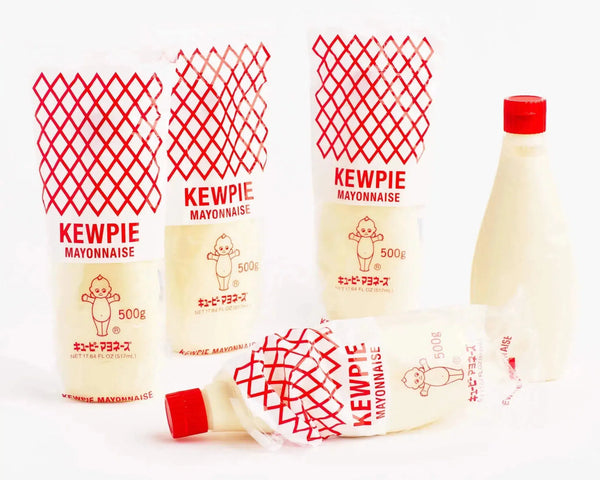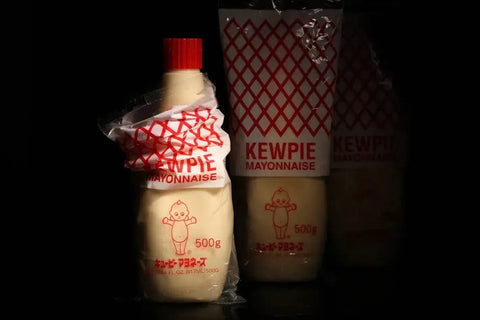
Jump to:
Are you familiar with Kewpie mayo? This Japanese mayo is not only a huge hit in Japan, but it recently became all the rage overseas, especially thanks to Emily Mariko’s salmon rice tiktok that went viral in 2021. Kewpie mayo is so popular because it is said to have a zingier, slightly sweeter, and richer taste than traditional mayonnaise. It also comes in a squeeze bottle, which allows you to precisely squeeze however much mayo you’d like rather than having to spoon it out from a jar. In this post, we are going to cover everything you need to know about Kewpie mayo including:
- A brief history of Kewpie Mayonnaise's creation
- Kewpie Mayo’s unique flavor traits
- Where to find Kewpie Mayonnaise
- Different kinds of Kewpie Mayonnaise
- Less commonly known Japanese dishes that use Kewpie Mayonnaise
- How to use Kewpie Mayonnaise outside of Japanese Cuisine
The History of Kewpie Mayonnaise

First, let’s have a little history lesson and take a look at Kewpie’s creation. Kewpie is the name of the company that created Kewpie mayo - the company’s flagship product. Kewpie mayo has been loved by consumers since 1925. The founder of Kewpie, Toichiro Nakashima, was originally inspired by American mayonnaise when he discovered it while working there in the 1920s. He felt that mayonnaise would be a great accompaniment to vegetables, but little did he realize what a versatile product Kewpie mayo would become! Almost 100 years later, Kewpie mayo is a condiment that can be found in virtually any Japanese household, and is now being sold overseas.
What Makes Kewpie Mayo Different From Other Mayonnaises?

Kewpie’s mayo is different from American mayonnaise for a few reasons. First, Kewpie only uses egg yolks in its product to give it a much richer taste and deeper yellow color. American mayo, on the other hand, uses whole eggs. Another key difference is that Kewpie mayo uses two kinds of vinegars in its mayonnaise recipe - rice vinegar and apple cider vinegar. On the other hand, American mayonnaise traditionally uses white distilled vinegar. Rice and apple cider vinegars both have a light sweetness, which can be tasted in Kewpie mayo. Kewpie mayonnaise also comes packaged in an easy-to-use squeezy bottle which keeps the product fresh for a longer time. It also prevents the vibrant yellow color of the mayonnaise from oxidizing.
A trait commonly found in Japanese foods is umami, and Kewpie mayo does not skimp on umami flavor. Kewpie mayo tastes so good because it contains a small amount of MSG, a food additive and flavor enhancer made from L-glutamic acid, and naturally occurring amino acid. MSG is often used in Asian cooking and when used in seasoning and sauces it adds a salty, savory taste, enhancing the umami flavor without the need to add extra salt.
Kewpie Mayo Ingredients
Kewpie Mayo is crafted from a select blend of ingredients that contribute to its distinctive taste and creamy texture. Unlike many Western mayonnaises that use whole eggs, Kewpie Mayo utilizes only egg yolks, which results in a richer, smoother consistency. The vegetable oil, usually soybean or canola oil, forms the base, while rice vinegar adds a unique tanginess that sets it apart from other mayonnaises that use distilled vinegar. Salt is included for seasoning, and monosodium glutamate (MSG) enhances the umami flavor, making Kewpie Mayo a beloved condiment in Japanese cuisine and beyond.
Where Can I Find Kewpie Mayo?

In Japan you can find many variations of Kewpie mayo products sold everywhere ranging from supermarkets, convenience stores, even 100 yen shops.
If you’re living overseas, Kewpie mayo can commonly be found in Asian supermarkets, Costco, and even major supermarkets! However, it is said that Kewpie mayo is often sold out of supermarkets and may need to be purchased online. Another thing to be wary of is that the American variant of Kewpie mayo contains white distilled vinegar instead of rice vinegar and apple cider vinegar. It also does not include MSG. These factors of course alter the flavor of Kewpie and take away from the light sweetness and umami flavor that it’s known for. If you want to find authentic Japanese Kewpie mayo, you can of course find it here at our shop.
Different Types of Kewpie Mayonnaise

But wait, there’s more to love about Kewpie! Kewpie does not only come in one variety. There are many to choose from depending on your preference and dietary needs. Whether you are vegan, looking for a cholesterol-free or low calorie option, or want to try a flavored-variety of Kewpie mayo, you can find the perfect Kewpie mayonnaise for yourself on Japanese Taste. We carry all of the above including:
We also have a variety of other Kewpie products including yummy Kewpie salad dressings and more!
How Can I Use Kewpie Mayo?

In our blog post about Japanese mayonnaise, we provided some typical Japanese recipes that commonly include Japanese mayonnaise, but let’s take a look at how Kewpie mayo is used in lesser known, or outside of the box Japanese foods.
Kewpie Mayo Egg Toast

A common breakfast dish made on busy mornings is Kewpie mayo egg toast, which features a thick slice of shokupan, or Japanese white bread, slathered in Kewpie mayo, finished with an egg cracked right on top. This toast is baked in the oven as is. Sometimes bacon, cheese, or vegetables are also added to make it more filling. This toast can be popped right into a toaster oven as well!
Kewpie Mayo As a Pizza Topping

Yes, it may sound a bit strange, but Kewpie Mayo is often featured as a topping for pizza. While it is used on a lot of Japanese-flavored pizzas, the most common arrangement featuring Kewpie mayo comes with corn, tuna, or even bacon. Shredded bits of nori are also commonly seen as a topping. Kewpie mayo-topped pizza is even available in Japanese Domino's and Pizza Hut restaurants.
Japanese Sweet Corn Kewpie Mayo Bread
This is a popular snack bread in Japan that can be found in convenience stores and bakeries. It is a soft and sweet bread, smeared with a mixture of Kewpie mayo and corn, which is then baked in the oven. Cheese is also sometimes added. It may be a high-carb, high-calorie bread, but it sure does make a delightful snack or treat.
Kewpie Mayo Corn Sushi

Yes, once again with the corn mayo theme, but a commonly found sushi in Japan is Kewpie mayo and corn sushi. It's basically mixture of corn and Kewpie mayo spooned on top of sushi rice, and wrapped in a piece of nori seaweed. It is especially popular among kids! This style of sushi is usually found at conveyor belt sushi restaurants but can be found in normal sushi restaurants too. It is recommended for those who are not a fan of raw fish.
Kewpie Mayo Tuna Sushi

It may be common knowledge that tuna and mayo pair well together, but did you know that this combination makes a popular topping for sushi? Similarly to the corn mayo style, the tuna and kewpie mayo mixture is added on top of sushi rice and then wrapped in a piece of nori seaweed. This is another common sushi item that can be found in conveyor belt sushi restaurants.
Using Kewpie Mayo Outside Of Japanese Cuisine

If you want to use Kewpie Mayo outside of Japanese cuisine, you can basically use it for any recipe that you would use traditional mayonnaise in. But here are some ideas:
- Add it into dips or sauces
- Use it plain as a dipping sauce for fried foods
- Use it as a condiment for toast, burgers, or sandwiches
- Replace butter with Kewpie mayo for grilled cheese sandwiches
- Mix it into fried rice
- Use as a substitute for oil in chocolate cake recipes
The world is your oyster. Try adding Kewpie mayo into any recipe you see fit! We hope that you’ll find a way to incorporate delicious Japanese Kewpie mayonnaise into your daily recipes!



0 comments